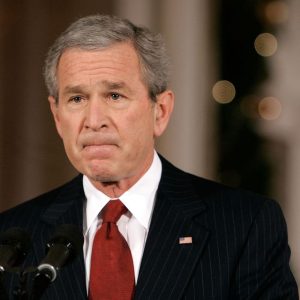I recently finished listening to the audiobooks for “An Ordinary Man, The Surprising Life And Historical Presidency Of Gerald R. Ford”, “The Definitive FDR: Roosevelt: The Lion and the Fox (1882–1940)”, “Roosevelt: The Soldier of Freedom (1940–1945)”, “Eisenhower In War And Peace”, and am presently just under the halfway mark of George Bush’s “Decision points”. I am presently a slow reader, so I listen to audiobooks at between 2.5 to 3.2 times speed. Some of the things that I learned from those books, that are plainly written for everyone to see and the obscene degree to which they contradict pervasively believed truths are absolutely astonishing. Here are some of my takeaways from “Eisenhower In War And Peace” and “Decision Points”, alongside some excerpts from them:
“Eisenhower In War And Peace”:
Takeaways:
– The author throughout this book strongly implies that Eisenhower was secretly bi-sexual and a sexual masochist, and was being blackmailed for it.
– The author who clearly had a deep knowledgeability of the the real, objective facts surrounding Eisenhower’s Presidency and American History had a deeply misogynistic attitude (which is a theme that I’ve noticed among these White House historians)
– Eisenhower wrote a letter to congress vouching for the character of Senator Joseph McCarthy and the genuineness of his ‘anti-communist crusade’.
Excerpts:
1. [Note: in this excerpt Eisenhower was delivering a speech to the Soviets in which he presented a surprise proposal to them which was drawn up for him by a team led by Nelson Rockefeller.] “Eisenhower told the Soviets that the terrible modern weapons they both possessed posed grave dangers of surprise attack. To minimize that danger, the president suggested that they “give to each other a complete blueprint of our military establishments, from beginning to end, from one end of our countries to the other.” The United States was also willing, if the Soviets would reciprocate, to open its skies for aerial photography so that each nation could scrutinize the other to reduce “the possibility of great surprise attack, thus lessening danger and relaxing tension.” Eisenhower said that practical progress toward a lasting peace was his fondest hope. “A sound peace—with security, justice, well being, and freedom for the people of the world—can be achieved, but only by patiently and thoughtfully following a hard and sure and tested road.
At the precise moment Eisenhower concluded, a tremendous flash of lightning followed by a clap of thunder filled the council chamber. Every light in the building went out. “It was the loudest clap of thunder I have ever heard,” said Eisenhower. “For a moment there was stunned silence. Then I remarked that I had not dreamed I was so eloquent as to put the lights out.”
2. “Frustrated by Ike’s response, Thomas turned to nuclear weapons. Wasn’t there a danger of espionage? Couldn’t the secret be stolen?
EISENHOWER: I am sure that if we could establish through the United Nations Organization a complete interchange of knowledge and free access of every government to every other, you would at least inspire confidence, and thereby you could give such secrets to all nations and it would make no difference.
THOMAS: Should the United States maintain its monopoly of atomic secrets?
EISENHOWER: Let’s be realistic. The scientists say other nations will get the secret anyway. There is some point in making a virtue out of necessity.”
3. [In “One Nation Under Blackmail: The Sordid Union Between Intelligence and Crime that Gave Rise to Jeffrey Epstein, Volumes 1 and 2 the author says that Roy Cohn was a close associate and friend of former FBI Director J. Edgar Hoover, that they were both being blackmailed for cross dressing, that he once served as the lawyer for Rupert Murdoch who might have also been being blackmailed, and that he was a mentor to Donald Trump who also might have been (and in his case still presently be being) blackmailed] “The high point of the hearings came with Roy Cohn on the witness stand. He was being examined by Welch about a cropped photo of Army Secretary Stevens and Private Schine. Welch wanted to know who had cropped the photo, and Cohn was being evasive. Finally, in exasperation, Welch said, “Surely, Mr. Cohn, you don’t suggest it was done by a pixie?”
McCarthy interrupted. “Point of order. Point of order, Mr. Chairman. Will Mr. Welch please tell the Committee what a pixie is?”
Welch savoured the moment. Turning to face the senator, Welch said: “Senator, a pixie is a very close relation to a fairy.” (In the 1950s, “fairy” was a pejorative term used to identify a man who was gay, and the close relationship between Cohn and G. David Schine was an omnipresent undercurrent in the hearings.)””
“Decision Points”:
Takeaways:
– George Bush’s tone about 9/11 – the way in which he is laughing his ass off about it is so unbelievable you have to read it and see for yourself. It is so baffling how brazen it is, and the fact that he wrote this book and published it for everyone to see is truly incredible.
– Most people hear the term “satanism” and think it’s a hyperbolic joke. This book paints a vivid picture of the reality that these people – the leaders of the “Free Masons” laugh at the most egregious forms of tragedy, make complete fools out of themselves lying like it’s nothing to them, and like coherence is nothing to them, and seriously in real life practice devil worshiping rituals and orient their social identities like children that are trying to get people to liken them to satan. “Why how evil of me …perhaps, even …Satanic?” Read the book and see how he gushes when talking about that time Hugo Chavez called him the devil. It’s not even funny, just cringeworthy. The first excerpt also relates to this point.
Excerpts:
1. God’s signs are not always the ones we look for. We learn in tragedy that His purposes are not always our own. Yet the prayers of private suffering, whether in our homes or in this great cathedral, are known and heard, and understood. … This world He created is of moral design. Grief and tragedy and hatred are only for a time. Goodness, remembrance, and love have no end. And the Lord of life holds all who die, and all who mourn.
2. [This quote does a pretty good job summing up Bush’s entire personality] “In December 1999, I attended a Republican debate in Des Moines. The moderators were Tom Brokaw of NBC and a local anchor, John Bachman. After covering some predictable topics, Bachman let loose a surprise: “What political philosopher or thinker do you most identify with and why?”
I was third in line to answer. I thought about citing someone like Mill or Locke, whose natural law theory had influenced the Founders. Then there was Lincoln; hard to go wrong with Abe in a Republican debate. I was still thinking when Bachman turned to me: “Governor Bush?” No more time to weigh my options. The words tumbled out of my mouth: “Christ,”I said,“because He changed my heart.”
Everybody looked stunned. Where had that come from? On the car ride back to the hotel, Mother and Dad checked in. They almost always called after major events. “Fine job, son,” Dad said. “I don’t think your answer will hurt you too much.” “Which answer?” I asked.“You know, that one on Jesus,” he said.
At first I hadn’t thought about the answer hurting me. I had just blurted out what was in my heart. Upon reflection, however, I understood the note of caution. I was skeptical of politicians who touted religion as a way to get votes. I didn’t believe in a Methodist or Jewish or Muslim approach to public policy. It was not the role of government to promote any religion. I hadn’t done that as governor of Texas, and I certainly didn’t intend to do it as president.
Sure enough, my words prompted an outcry. “There is something unholy about this,” one columnist wrote.”
3. “Zubaydah had been severely wounded in a gun battle prior to his arrest. The CIA flew in a top doctor, who saved his life. The Pakistanis then turned him over to our custody. The FBI began questioning Zubaydah, who had clearly been trained on how to resist interrogation. He revealed bits and pieces of information that he thought we already knew. Frighteningly, we didn’t know much. For example, we received definitive information about a new alias for Khalid Sheikh Mohammed, who Zubaydah also confirmed had masterminded the 9/11 attacks.
Then Zubaydah stopped answering questions. George Tenet told me interrogators believed Zubaydah had more information to reveal. If he was hiding something more, what could it be? Zubaydah was our best lead to avoid another catastrophic attack. “We need to find out what he knows,”I directed the team. “What are our options?”
One option was for the CIA to take over Zubaydah’s questioning and move him to a secure location in another country where the Agency could have total control over his environment. CIA experts drew up a list of interrogation techniques that differed from those Zubaydah had successfully resisted. George assured me all interrogations would be performed by experienced intelligence professionals who had undergone extensive training. Medical personnel would be on-site to guarantee that the detainee was not physically or mentally harmed.
At my direction, Department of Justice and CIA lawyers conducted a careful legal
review. They concluded that the enhanced interrogation program complied with the Constitution and allapplicable laws, including those that ban torture.
I took a look at the list of techniques. There were two that I felt went too far, even if they were legal. I directed the CIA not to use them. Another technique was waterboarding, a process of simulated drowning. No doubt the procedure was tough, but medical experts assured the CIA that it did no lasting harm.
I knew that an interrogation program this sensitive and controversial would one day become public. When it did, we would open ourselves up to criticism that America had compromised our moral values. I would have preferred that we get the information another way. But the choice between security and values was real. Had I not authorized waterboarding on senior al Qaeda leaders, I would have had to accept a greater risk that the country would be attacked. In the wake of 9/11, that was a risk I was unwilling to take. My most solemn responsibility as president was to protect the country. I approved the use of the interrogation techniques.
The new techniques proved highly effective. Zubaydah revealed large amounts of information on al Qaeda’s structure and operations. He also provided leads that helped reveal the location of Ramzi bin al Shibh, the logistical planner of the 9/11 attacks. The Pakistani police picked him up on the first anniversary of 9/11.
Zubaydah later explained to interrogators why he started answering questions again. Zubaydah later explained to interrogators why he started answering questions again. His understanding of Islam was that he had to resist interrogation only up to a certain point. Waterboarding was the technique that allowed him to reach that threshold, fulfill his religious duty, and then cooperate. “You must do this for all the brothers,” he said.”










